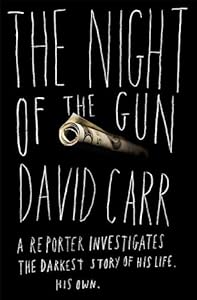Autobiographical tales featuring survivors of drug addiction and substance abuse have always been popular. There is something intriguing about listening as someone describes hitting rock bottom, and then somehow managing to miraculously turn themselves around.
Of course, such books are so popular that one must sometimes wonder whether the facts have been embellished for the sole purpose of entertainment. The debacle surrounding A Million Little Pieces alerted the literary community to the dangers behind that. While biographies involve investigations on behalf of the author, autobiographies become suspect, as the possible motivations of the self-diarists make them unreliable witnesses at best.
This is where David Carr's book steps away from the rest of the pack. The Night of the Gun almost doesn't qualify as an autobiography. He remembers very little of what actually occurred during his days of drug abuse, and what he does remember is almost wholly unreliable. So, be an investigative reporter, he uses the skills on hand to delve into the mystery that is his own life.
This is where Carr's book leaves the others behind. He wanders through the down and out periods of his life with a grim curiosity that never lapses into self-pity or melodrama. He could be writing about somebody else entirely, and in some ways, he is. His style isn't emotionless; one would have to be truly cold and indifferent not to feel something while looking back on some of the things Carr did had had done to him. But there is a slight detachment from the source material that keeps his observations from becoming self-serving or, even worse, self-pitying. He not only makes no excuses for his own actions, he doesn't even understand some of them himself.
Carr's book will appeal to fans of similar books, such as Permanent Midnight, but don't expect a carbon copy of the format. If Carr's story doesn't appear to have the obviously uplifting ending or tone that you were expecting, that's because it wasn't meant to be that kind of book. Carr isn't telling us his story so we can learn from his mistakes. He exploring his own painful past, like probing the raw nerve beneath a sore tooth, because he just can't bring himself to leave it behind, at last not without knowing what it all must have appeared from the outside looking in.

![Reblog this post [with Zemanta]](http://img.zemanta.com/reblog_c.png?x-id=dfa2785f-b2af-4583-8ba0-0baefed12f33)
No comments:
Post a Comment